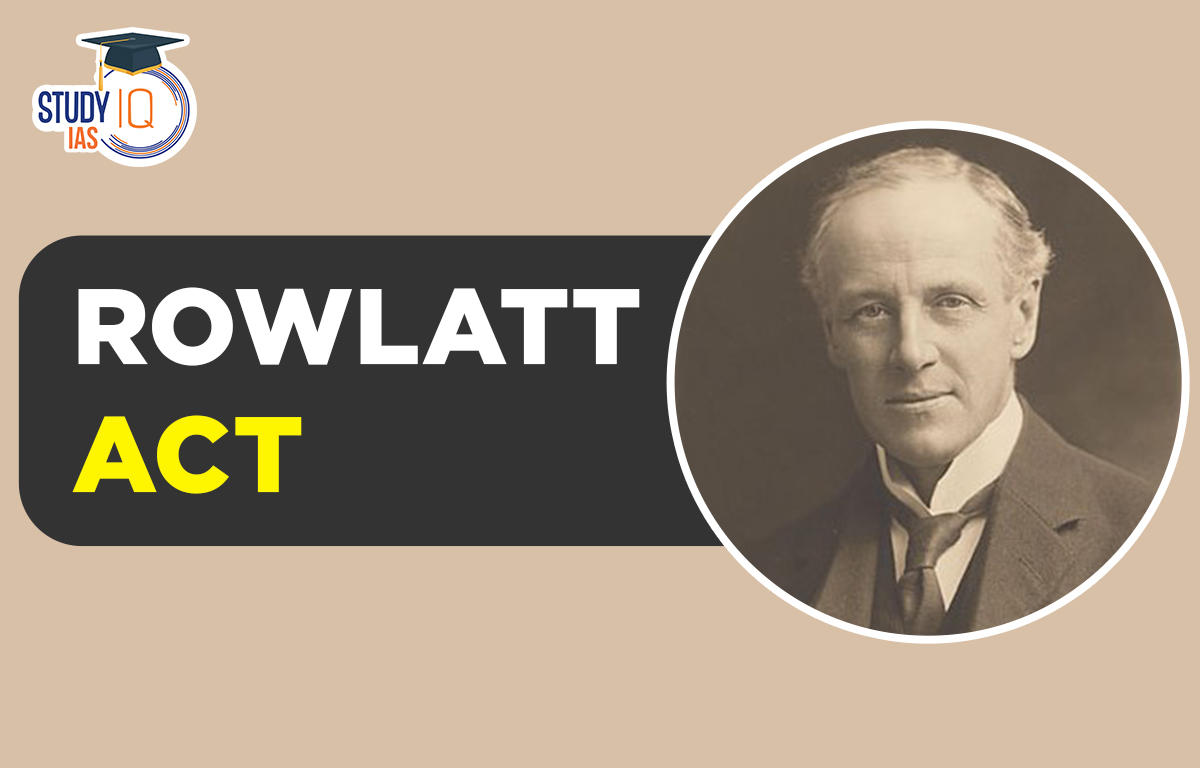Table of Contents
Rowlatt Act 1919
The British Legislative Council passed the Anarchical and Revolutionary Crimes Act of 1919, widely known as the ‘Rowlatt Act,’ in February 1919. This Act gave the government the power to imprison any person accused of conspiring to overthrow the British empire, for up to two years without trial and to execute them without a jury.
The act was prepared on the recommendation of the Rowlatt Commission (1918) replacing the old Defense of India Act (1915), which was enacted during the First World War, with a permanent statute that granted the British government additional control over Indians.
Mahatma Gandhi called the Rowlatt Act a “Black Act” or “Black Bill,” which sparked the horrific Jallianwala Bagh Massacre in April 1919, as a reaction to which the Non-Cooperation Movement was launched by INC. British Government on March 1922, abolished the Rowlatt Act, the Press Act, and twenty-two other laws after adopting the recommendations of the Repressive Laws Committee.
Read about: Charter Act of 1833
Rowlatt Commission
The commission was appointed in 1918 by the British Government. The commission was headed by Sir Sydney Rowlatt other members of the commission were J.D.V Hodge, Basil Scott, Verney Lovett, PC Mitter and CV Kumaraswami Sastri.
The purpose of the commission was to investigate the revolutionary movement in India and also to prepare a detention policy. The commission recommended detaining or imprisoning the revolutionaries without any trials.
Read about: Charter Act of 1853
Rowlatt Act 1919 Provisions
Rowlatt Act was passed in February 1919. The act empowered the police to search the house, and detain or arrest any suspected individual as well as political activists without any warrant or trial. A special tribunal was established solely for the trial of the arrested individuals.
The three high court judges will preside over the tribunal. There was no provision for any legal aid with the arrested individual and he will be trialled in secrecy. Any judgement held by the judges will be final with no court of appeal.
Tribunals can accept all sorts of evidence even which are invalid under Indian Evidence Act. The British Government was also empowered to exercise strict control over the press and the ongoing revolutionary activities.
Read about: Charter Act of 1793
Rowlatt Satyagraha
Rowlatt Satyagraha was the first complete all-India uprising against British Rule (as the Revolt of 1857 failed to grab all Indian sentiment). Rowlatt was opposed by the nationalist leaders as well as the commons. There were anger and resentment against the British government across India regarding this law.
The resignation was handed over by the Indian elected representatives of the Legislature as Mazhar Ul Haq along with Madan Mohan Malviya and Md Ali Jinnah resigned from the council after voting against the bill.
Mahatma Gandhi initiated Rowlatt Satyagraha against this demonian act and in February 1919, he founded Satyagraha Sabha. He called for a mass protest at the Pan India level and asked the peasants and artisans for their political support.
In several parts of the country, the anti-colonial demonstration was started even before the Satyagraha was launched. Punjab during a similar demonstration witnessed the inhuman massacre of Jallianwala Bagh which shook the entire nation resulting in a movement on a bigger scale was launched in 1920 the Non-Cooperation Movement which merged with Khilafat Movement giving tremendous momentum to the Indian freedom struggle.
Read about: Charter Act of 1853
Jallianwala Bagh Massacre
On the Ground of Rowlatt Act provisions two nationalist leaders Dr Satyapal and Saifuddin Kitchlew were arrested on 9th April 1919 when they were addressing a meeting, it was an alarming situation in Punjab as there were riots and protest opposing the Rowlatt act.
Martial Law was imposed in Punjab, as per which it will be unlawful if more than 4 people assemble at a place. On 13th April 1919 on the day of Baisakhi, a crowd of non-violent protesters gathered in a public garden at Amritsar.
Michael O’ Dwyer with his troops blocked the only entrance of the garden and fired on the unarmed crowd without warning which included children’s as well, killing thousands of innocent people and destroying the faith of Indians in the British system of Justice. To inquire about this heinous massacre British Government setup a commission named Hunter Commission.
Read about: Indian Councils Act 1861
Hunter Commission
British Government to investigate the wrongdoings of the Jallianwala Bagh incident appointed a commission named Hunter commission on 14th October 1919. It was a 7 membered commission under the chairmanship of Lord William Hunter. The commission submitted its final report on March 1920, in which it condemned the act of General Dwyer. However, it did not impose any penalty or took any disciplinary action against General Dwyer.
Read about: Indian Council Act of 1892
























 WhatsApp
WhatsApp